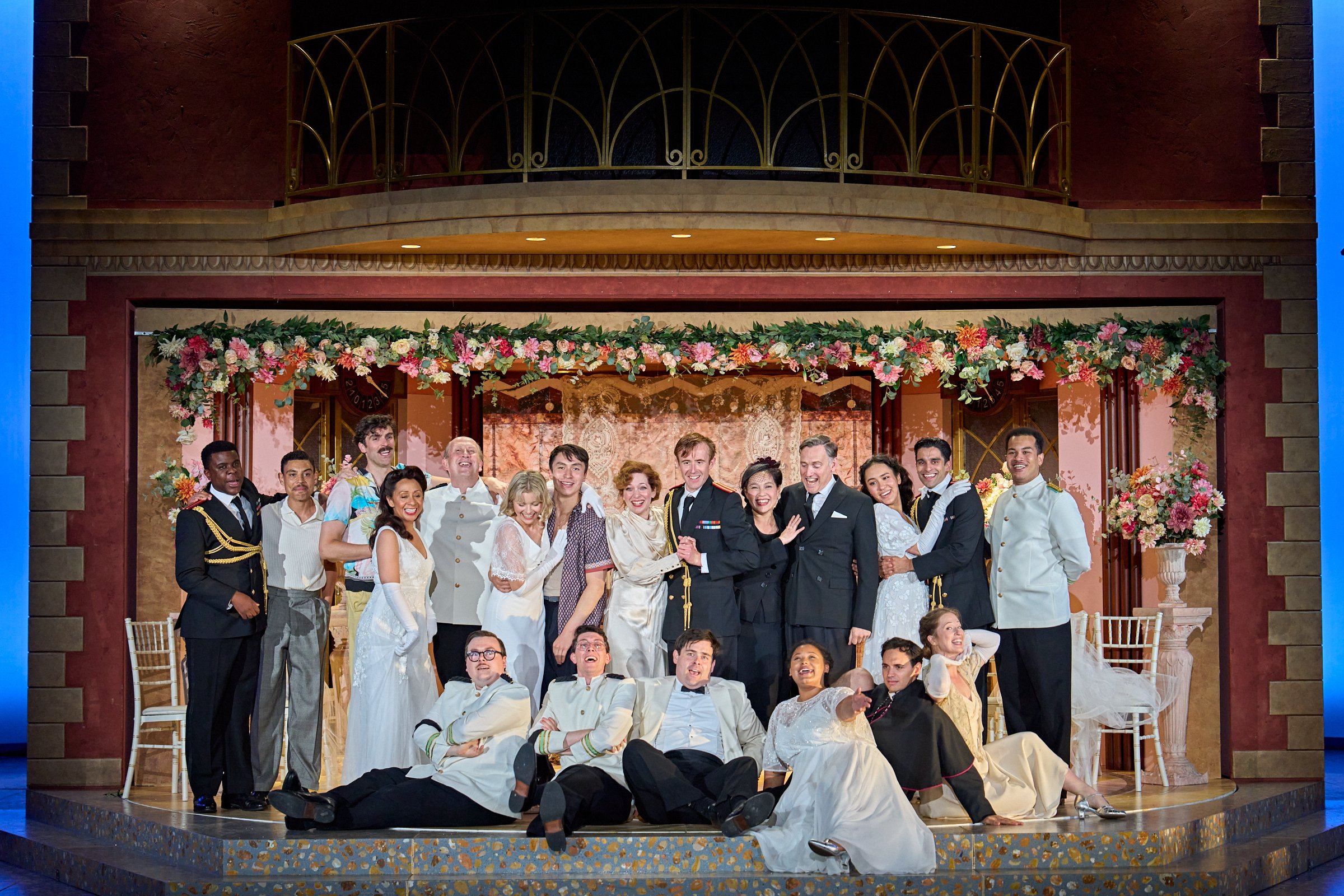by Jim Keaveney.
The National Theatre’s production of Much Ado About Nothing represents a dilemma for the more casual theatre-goer; whether to plump for an evening at the National or an evening at the Globe, where Much Ado About Nothing is also being performed in rep, having opened in April. It seems strange to have two productions of the same play being performed less than a mile apart along London’s South Bank and, despite their respective draws, there must be some impact on their respective potential revenue streams at a time when theatres are still emerging from the pandemic.
 |
| The complete cast of Much Ado About Nothing. Photo: Manuel Harlan |
It also creates a dilemma for theatre critics; the immediate reaction is to complete a compare and contrast exercise between the two offerings – but this would not be fair on either production. They both have their merits, and occasional misfires, and deserve to be critiqued on their own terms. With that out of the way, we can get to the meat of the question; how good is Simon Godwin’s production of Much Ado About Nothing?
We are at the Hotel Messina, a decadent hotel in an imagined past where Don Pedro’s (Ashley Zhangazha) soldiers are returning from an unidentified conflict. Anna Fleischle’s decadent hotel set brings to mind Evelyn Waugh’s Vile Bodies and the bright young things of the 1920s, with the towering central building doubling as the hotel lobby, a bar and a beach room and its balcony housing the house swing-band. Evie Gurney’s costumes only add to the stylisation. Among the Prince’s company are Benedick (John Heffernan) and Claudio (Eben Figueiredo). Claudio immediately falls for Leonato’s (a politician-like Rufus Wright) daughter Hero (Ioanna Kimbook) while Benedick resumes a ‘merry war’ with Leonato’s niece Beatrice (Katherine Parkinson).
%20Manuel%20Harlan%20(2).jpg) |
| John Heffernan and Eben Figueiredo. Photo: Manuel Harlan |
Parkinson’s comedy acumen isn’t as strong as usual here. It’s strange because Beatrice is a role where she should excel – it’s not that she is not good but there are moments of comedy that feel forced and a general feeling that there is more that she could do with the character. She is better in the more serious moments in the second half that follow Hero’s wedding where she and Heffernan finally gel, having struggled to find the right note in the couple’s love/hate relationship in the first half.
Despite those chemistry issues, Heffernan is the stand-out performance of the evening – he is incredibly watchable as Benedick, with perfect comic timing. His concealment in a gelato cart while eavesdropping on his companions could have entered dangerous Carry-On territory, as he uses his hands to roll the cart across the stage. But his emergence, covered in ice cream and sprinkles, and his denouncement of his previous views on marriage are a comic delight.
%20Manuel%20Harlan.jpg) |
| Ioanna Kimbook and Phoebe Horn. Photo: Manuel Harlan |
However, this really is an ensemble piece. Eben Figueiredo, fresh from his second stint in Cyrano de Bergerac, masters Claudio’s journey from infatuated to enraged to remorseful, though he is arguably underused in the role. Opposite Figueiredo, Ioanna Kimbook delivers an understated performance as Hero, radiating her joy and emanating her sorrow. Don John’s small, though important, role in proceedings means that we do not see anywhere near enough of David Judge – it feels like we do not scratch the surface of his potential in what is generally a one-dimensional villain role.
It may not be a perfect or subtle piece of theatre, that’s not what Much Ado About Nothing will ever be, but what we can say is that on the hottest day of the year to date (until tomorrow’s predicted all-time highest temperature) Godwin’s production provides a joyous and welcome distraction from the outside world.
Much Ado About Nothing is at the Lyttelton Theatre, National Theatre until 10 September
Jim Keaveney is the lead critic at The Understudy. He tweets occasionally from @understudyjim














